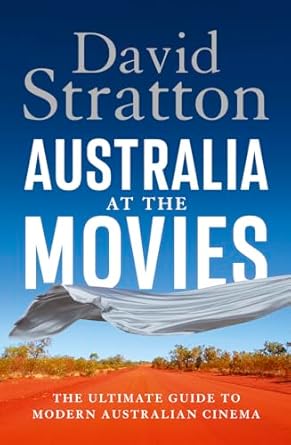
- Free Article: No
- Contents Category: Film
- Review Article: Yes
- Article Title: The great curmudgeon
- Article Subtitle: A critic’s labour of love
- Online Only: No
- Custom Highlight Text:
In this much-delayed final instalment of David Stratton’s trilogy on Australian cinema, the use of the word ‘ultimate’ in the book’s subtitle is no hyperbole. Stratton has been a film critic, television presenter, historian, and lecturer for sixty years, and during that time he has been assiduously recording information on the countless home-grown films he has seen. His knowledge of the local film industry is formidable and possibly peerless.
- Featured Image (400px * 250px):

- Alt Tag (Featured Image): Richard Leathem reviews ‘Australia at the Movies: The ultimate guide to modern Australian cinema 1990-2020’ by David Stratton
- Book 1 Title: Australia at the Movies
- Book 1 Subtitle: The ultimate guide to modern Australian cinema 1990-2020
- Book 1 Biblio: Allen & Unwin, $39.99 pb, 557 pp
- Book 1 Cover Small (400 x 600):

- Book 1 Cover (800 x 1200):

- Book 1 Readings Link: https://www.readings.com.au/product/9781761472091/australia-at-the-movies--david-stratton--2024--9781761472091#rac:jokjjzr6ly9m
That delay has resulted in a broader period to encompass and the exhaustive attempt to include every accessible fiction feature-length production has induced a more cursory encyclopedic listing of the films listed. There is little room for the deeper analysis into select titles we found in the previous volumes.
Stratton provides a synopsis and brief critique of each film, and lists the cast, significant craft contributions, and any significant awards or accolades. Films are divided into themes, such as sexual relationships and multicultural stories. This allows a certain continuity. For example, Van Diemen’s Land (2009) is followed by The Nightingale (2018), films set in the same period and place and dealing with similar issues. To this point, the book differs from other film reference guides, like the Leonard Maltin film capsule reviews. Stratton’s entries are not always reviewed in isolation. For example, on Rolf de Heer’s Epsilon (1995) he observes that the tale of an intelligent alien thrown into a world of stupidity contrasts with de Heer’s previous Bad Boy Bubby (1993) in which a simple, uneducated man is released into a cruel world.
Stratton’s status in the local film industry and his high profile for a film critic means that sometimes he is a part of a film’s history; quite rightly, he includes himself in some entries. He was on the Venice Film Festival jury the year that Warwick Thornton’s Sweet Country (2017) was awarded the jury prize, which he personally presented to Thornton. He also recounts the time that Andrew Bolt, a Stolen Generations denier, lambasted him for his praise of Rabbit-Proof Fence (2002).
He mentions the ‘celebrated scandal’ encouraged by Geoffrey Wright, director of Romper Stomper (1992), when Stratton, on The Movie Show, refused to rate the film, ‘a decision prompted by the fear that the film would unwittingly lead to violent racism’. Stratton admits his actions were perhaps naïve.
At the height of his television career, Stratton’s reputation for championing local films began to backfire. Many considered that he was too generous and that a high rating from him was so commonplace that it lost its cachet. There is no evidence of misplaced generosity in Australia at the Movies. He finds fault with plenty of the 645 titles listed.
Despite Stratton’s clear enthusiasm for cinema and respect for filmmakers, the most entertaining passages are during his rather clipped, derogatory remarks about films he doesn’t like. Tunnel Vision (1994) is ‘as offensive as it is dim-witted’, Swinging Safari (2017) is ‘a laughless lump of a film’, and of Men’s Group (2008) he says, ‘This grim little film is compromised by tiresome photography (unnecessarily unsteady camerawork) that detracts from the drama by needlessly drawing attention to itself.’
Stratton’s abhorrence for ‘shaky cam’ is well known, and he never misses an opportunity here to take a cinematographer to task for their use of handheld camerawork. Being a reference guide, Australia at the Movies is not designed to be read from cover to cover. If you were to do so, references to camerawork that is ‘wobbly’, ‘shaky’, ‘jerky’, ‘queasy’, ‘unsteady’, or ‘atrociously ugly’ would be laughably repetitive.
Another Stratton peeve is almost as omnipresent. He is reluctant to find fault with Australian actors, but often seems resentful of imported actors when not playing specifically foreign roles. Of Sweet Talker (1990) he says, ‘Karen Allen seems ill at ease and out of place in a cast otherwise composed of excellent Australian-based actors.’ ‘Miscast’ elsewhere are Christina Ricci, Kelly McDonald, Garrett Hedlund, and Jimmy Smits. Giovanni Ribisi is ‘whiny’, George McKay ‘dire’, and Brenda Blethyn accused of ‘overplaying’. Stratton does praise a few, but the brickbats far outweigh the bouquets.
Even Kate Winslet incurs his contempt in The Dressmaker (2015), although the gripe concerns her age rather than her nationality. In this respect, Stratton belongs to a group of people that Alfred Hitchcock coined ‘The Plausibles’, people who nitpick about practical things like Kate Winslet being too old to be Liam Hemsworth’s high-school sweetheart, or that Keisha Castle-Hughes is the wrong dress size in Hey Hey It’s Esther Blueberger (2008) to lend the titular character her school uniform. Regarding Proof (1991) he asks, ‘Wouldn’t a woman as attractive as Celia have other friends? How does Martin support himself?’ Stratton is equally irritated that there is no explanation offered for Rosanna Arquette’s American accent in Wendy Cracked a Walnut (1990).
Stratton is entitled to his bugbears; all critics have them. His stern countenance is part of his appeal, and there is a certain enjoyment to imagining his disparaging tone of voice when reading his quibbles.
Despite the carps, Australia at the Movies is clearly a labour of love and a testament to David Stratton’s lifelong dedication to Australian cinema.


Comments powered by CComment